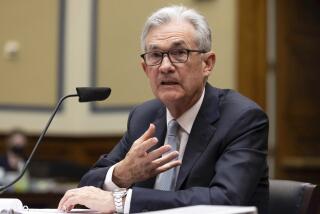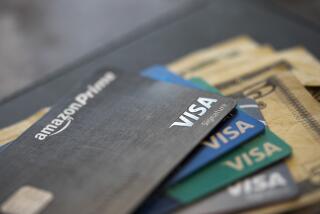Europe’s Message About the U.S. Economy
- Share via
Distant and confusing events are affecting your standard of living and your business--although, like the moon’s effect on the tides, the connections are not readily apparent.
The first event of note is that the British pound is entering the European Monetary System (EMS), which means that the pound’s value is being tied to that of the German mark.
The second event is that the U.S. dollar continues to fall in world markets against the mark and other European currencies, as well as the Japanese yen.
Those events contain lessons and foreshadowings for Americans: They tell us what happens to a country that cannot manage its own affairs in today’s world, where global investment markets give orders to governments. They tell us why the value of the German mark keeps rising, despite what some U.S. experts see as the “costly burden” of unifying with East Germany. Finally, they tell us what kind of fix the U.S. economy is in and what that promises in terms of interest rates and standard of living.
First Britain. In joining the EMS, Britain entered an arrangement in which Belgium, Denmark, France, Germany, Holland, Ireland, Italy, Luxembourg and Spain agree that the value of their currencies will fluctuate only 2.5% against the German mark. The mark was chosen as anchor because it is believed that the German government and central bank can be relied upon to follow non-inflationary economic policies.
The EMS is a discipline. When the currency of a small and relatively poor country such as Ireland is in the EMS, its internal economic policies are influenced by those German policies. So, in fact, Ireland and other EMS members have relatively low inflation these days, which means that their interest rates can be low also, encouraging business investment in their countries.
In turn, that combination of low inflation and high investment makes EMS countries attractive to today’s global markets, where banks, corporations and governments trade $400 billion a day in currencies, amounts far outstripping world trade in goods and services. Such markets ultimately are the source of capital for nations and corporations. And being in the EMS “gives governments credibility,” says Miles Kahler, a professor of international relations at UC San Diego.
Britain lacked such credibility, which meant that lenders to British business or the government demanded higher interest to insure against inflation or currency fluctuation. As a result, Britain had interest rates of 15% for the last year, crippling home-mortgage lending and driving British companies into bankruptcy. When Britain agreed to tie its currency to the German mark, it was allowed to lower its interest rates and give a boost to business.
That’s interesting, because some experts see the German economy weakening and becoming inflationary, thanks to the costs--as much as $1 trillion over 10 years--of bringing East Germany into union with the West. Yet the mark isn’t falling; it continues to strengthen against the dollar. Which means that global markets see the money pouring into East Germany not as waste but as investment that will yield a return, further strengthening the German economy.
In parts of Europe, the mark is now becoming what the U.S. dollar was for years after World War II, the money that cab drivers and shopkeepers everywhere accepted for its reliable value.
To be sure, the dollar is still the world’s most widely used currency. But its value has been falling as world markets see the U.S. economy weakening and its leadership refusing to deal with the budget deficit. Foreign investment from Japan and Europe is no longer buying U.S. government bonds to finance that deficit. So domestic savings will have to do so, which means money will be scarce for other purposes. In a word, look for high interest rates to continue.
How did we get into this pickle? Self-indulgence, said Senate Majority Leader George Mitchell (D-Maine) in a speech on Monday explaining the need for budget discipline. “Our country has been through a decade of indulgence, and now we must pay for that indulgence.”
But many Americans, who saw their paychecks shrink in the 1980s, will ask whom Mitchell is talking about. Where was the indulgence?
Well, the stock market went up, which means that the pension funds of corporations and public employees--the really big investors these days--made gains. There was also a lot of money made in corporate mergers and buyouts. And savings and loans and banks financed office buildings, shopping centers and other commercial real estate.
But are we getting a return on that money today? Did investments in mergers and office buildings boost America’s productivity? World markets are saying no. They are saying Europe, West and East, offer better investment opportunities these days than America. And so the mark is up and the dollar is down.
And the prospect is for years of capital shortage. In this decade, says John Rutledge of Claremont Economics Institute, the successful business manager will “squeeze dollars out of existing resources.” That’s not a prospect for low interest rates.
Yet with a low dollar, U.S. exports should be strong, says Albert M. Wojnilower, senior economist of First Boston Corp. “We will work for others to earn our keep,” he says, and adds: “Of course, we already are, with troops in the Persian Gulf defending the world economic system.” Maybe world markets will pay the United States for that defense, with a hike in the dollar and streams of investment capital. But they haven’t yet.
More to Read
Inside the business of entertainment
The Wide Shot brings you news, analysis and insights on everything from streaming wars to production — and what it all means for the future.
You may occasionally receive promotional content from the Los Angeles Times.










